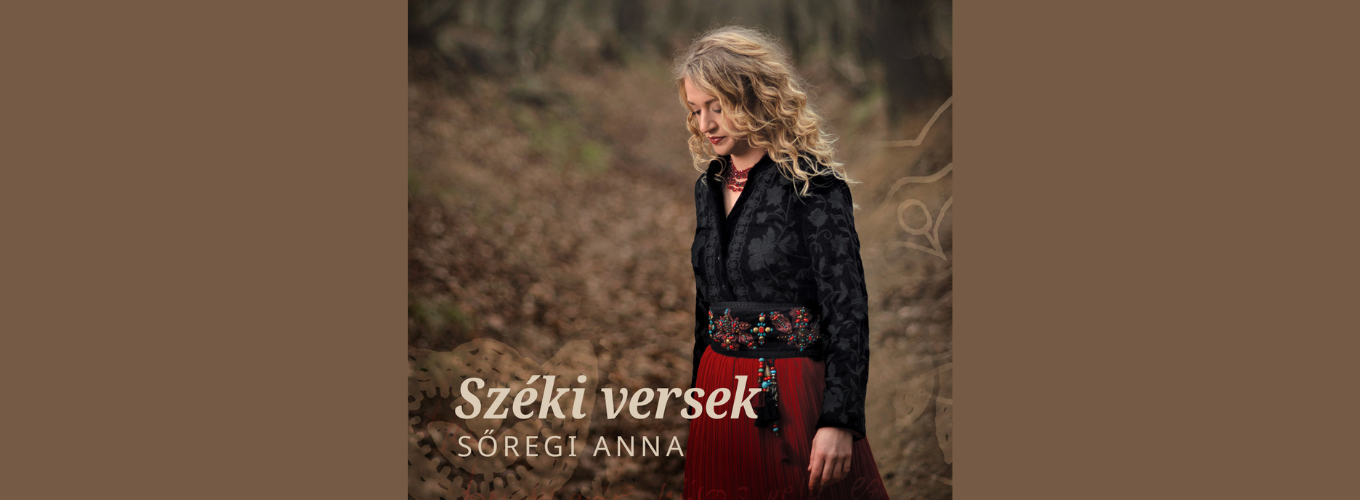
Söregi Anna: Széki Versek (Poems from Szék)
"When I began working on this record, I found myself entangled in the abundance of material that has been collected in Szék. I was overwhelmed not only by the large number of song texts and thousands of variations but also by the emotional tone and performance style characteristic of the singers in Szék who brought so much expression and life to the texts found in both the early Lajtha Pátria collections and more recent collections. Every great singer from Szék sings the lyrics to a given melody according to their own taste and fate, which is what makes them so personal. In this respect I consider Mrs. Márton Ungvári (Prózsa Zsuzsa), Mrs. György Sándor Sípos (Juhos Zsuzsa), Mrs. Márton Papp (Fülöp Mária), János Csorba, György Szabó Varga, Ferenc Székely to be my masters even though I never had the opportunity to meet them. Yet their art and the lost world they lived and represent speaks to me – and hopefully to many – even in the present. May this timeless music play in their memory."
If we mention the Transylvanian village of Szék to a young Hungarian who frequents the urban dance houses, it is likely that Péter Korniss’ emblematic photographs taken in Szék in the 1960s and 70s come to mind. Considering Korniss’ reknown, others outside of the dance house scene may also remember his photographs of small, smoky rooms in the village homes. The idea for the dance house movement came from the social dance events held in those village houses in Szék, before it set off on its journey around the world.
Our example of the Szék dance houses may well have been forgotten by many in the urban dance houses, if they ever knew about it to begin with. This form of recreation was closely tied (and not only in Szék) to the time of life when young people choose a partner, the girls blossomed, the unmarried young men had already been confirmed (in the Calvinist faith), but had not yet been taken away for the compulsory, soul-changing military service. This teenage period is one of the most definitive times in every person’s life and perhaps explains the clear, expressive, emotional texts about love and finding a partner found on this recording. In many cases, the emotions expressed came from the masterpieces of 19th century Hungarian poets that had broken off and begun to live one their own in folklorized forms. Today the Hungarian period of “national awakening” may appear naïve in its similarities to the spirit of a young peasant of the time. It could be that they taught about the poets of the national awakening in the school in Szék in the period after the Second Vienna Award – the 1940s – so perhaps poetry’s infiltration into the local folklore can be traced back to this. As a young adult of the 21st century, the sincerity of this poetic world has long captivated me. Certainly these messages from the past can also be valid in the modern world. They tell us that human nature and European culture may not have changed so significantly even though we live today through the monitors of our mobile telephones.
- Gondold meg édesem elejét-utolját
2. A mi szerelmünknek vége ne szakadna
3. Egy szép csillag ragyog
4. Nem hitted, hogy beteg vagyok
5. Jön az ősz, megy a gólya már
6. Hallottátok Forrószegen mi történt?
Total time: 01:09:35
Sőregi Anna voice
Halmos Attila hegedű, violin, voice (1, 2, 3)
Gombai Tamás violin (5)
Árendás Péter 3 stringed viola, voice (2,3,5)
Havasréti Pál double bass, small bass, cello, voice (2,3,5)
Juhász Zoltán wooden flute (4)
Liber Endre cymbalom (1)
Kelemen László harmonium (3)
Szabó Annamária voice (3)
Sípos Márton greetings (3)
Music director: Kelemen László
Text selection: Sőregi Anna
Production director: Liber Endre
Recording, mastering: Dióssy Ákos
Photos: Korniss Péter, Bezzeg Gyula
Design: Gulyás-Szabó Luca
Proofreading: Asztalos Emese
Translation: Csúzdi Sára
English revisions: Sue Foy
Printing editor: Szilasi Marianne
Thanks to László Kelemen for our work together over the years.
I am grateful to Péter Árendás, Tamás Gombai, Attila Halmos, Pál Havasréti, Zoltán Juhász and Endre Liber for their musical advice, ideas and for the joy and enthusiasm they showed towards this project.
Many thanks to Sípos Márton for the traditional name day greetings, to Ákos Dióssy for his fantastic work, and to Gyula Kozma "Kosztya" for lending his small bass.
And finally very special thanks to Péter Korniss for making his photographs available for this publication.
Recorded in Budapest at Barázda Studios, October, 2021.